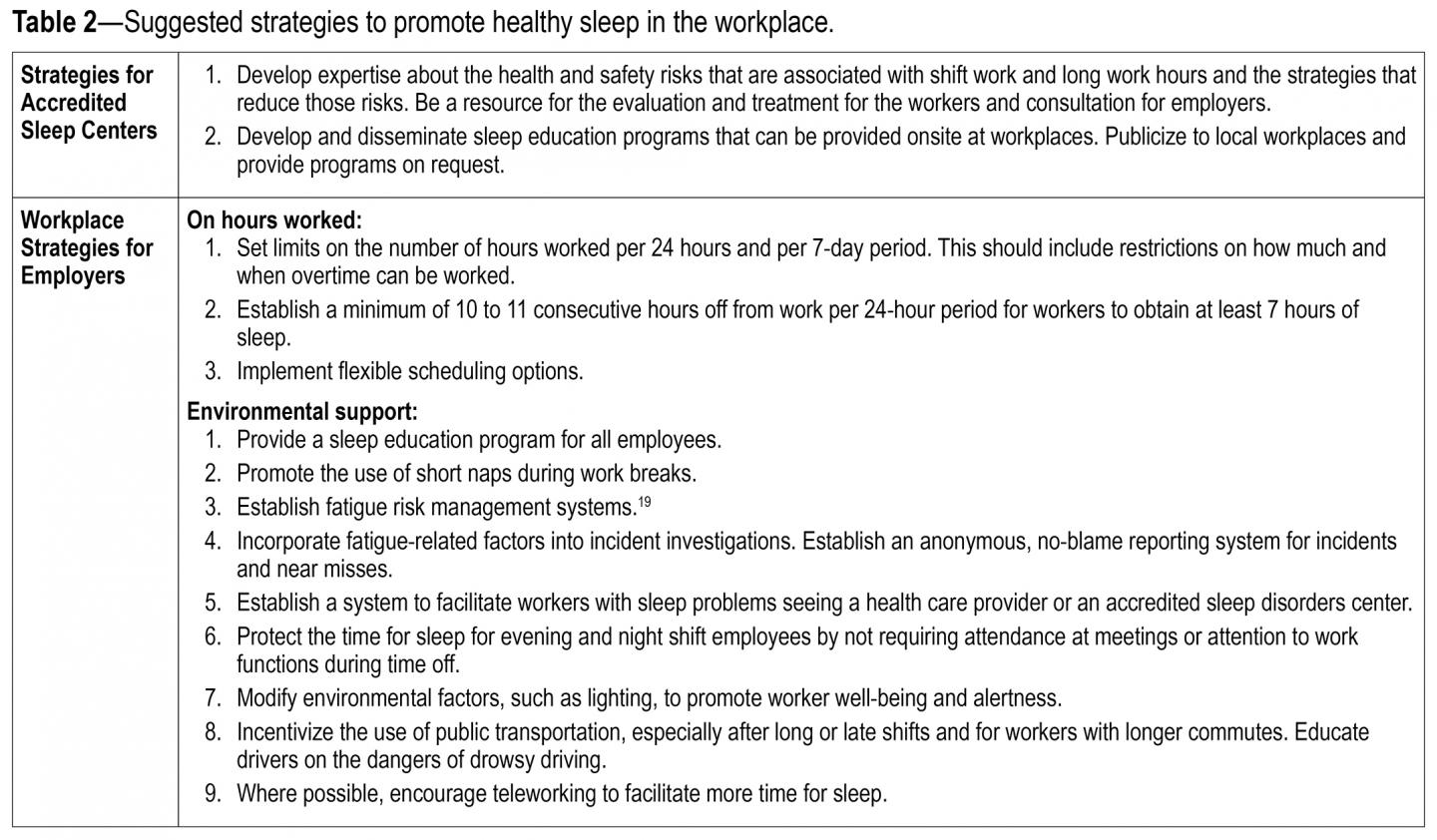Educational programs encourage better sleep and sleep-related outcomes

Credit: Journal of Clinical Sleep Medicine
DARIEN, IL – Simple workplace interventions, like educating employees about the importance of sleep and providing behavioral sleep strategies, may produce beneficial results, according to a new review.
Results show that in most studies, employer-sponsored efforts to encourage improved sleep hygiene and healthier habits have yielded improvements in sleep duration and sleep quality, as well as a decrease in self-reported sleepiness complaints. While the most common workplace interventions were educational programs emphasizing sleep hygiene or fatigue management, other interventions included napping at specific times before or after work, urging increased daytime activity levels, modifying workplace environmental characteristics such as lighting, and screening and referral for sleep disorders treatment.
“These studies suggest employer-sponsored efforts can improve sleep and sleep-related outcomes,” said lead author Nancy S. Redeker, PhD, RN, FAHA, FAAN, a Beatrice Renfield Term Professor of Nursing at the Yale School of Nursing in Orange, Connecticut. “Improving sleep also may lead to better quality of life and decreased absenteeism from work.”
The review is published in the April 15 issue of the Journal of Clinical Sleep Medicine. It was conducted by representatives of the American Academy of Sleep Medicine (AASM), Centers for Disease Control and Prevention (CDC), and Sleep Research Society (SRS) as part of the National Healthy Sleep Awareness Project, a five-year cooperative agreement that concluded in 2018.
The authors offer 12 suggested workplace strategies that employers can implement to promote healthy sleep among their workforce. These strategies include:
- – Setting limits on the number of hours worked per 24 hours and per 7-day period
– Establishing a minimum of 10 to 11 consecutive hours off from work per 24-hour period for workers to obtain at least 7 hours of sleep
– Providing a sleep education program for all employees
– Promoting the use of short naps during work breaks
– Establishing fatigue risk management systems
– Establishing a system to facilitate workers with sleep problems seeing a health care provider or an accredited sleep disorders center
– Modifying environmental factors, such as lighting, to promote worker well-being and alertness
The authors conducted a systematic search and a selective narrative review of studies published from 1966 to December 2017. A total of 60 papers met the inclusion criteria and were included in the narrative review. Extracted information included types of workplaces, occupations of the workers, types of interventions, and sleep-related outcomes. Based on these characteristics, the authors identified three major categories of sleep interventions: educational interventions, interventions focused on health promotion behaviors that might improve sleep (e.g., physical activity), and interventions focused on workplace environmental modifications to promote sleep.
According to CDC data, only 65% of adults report getting the recommended 7 or more hours of sleep on a regular basis. Chronic insufficient sleep is estimated to cost the U.S. economy more than $410 billion annually due to workplace repercussions such as absenteeism and reduced productivity.
“Sleep deprivation contributes to accidents and injury in the workplace and other settings, as well as absenteeism and poor quality of life,” said Redeker. “Our review suggests that providing strategies to improve sleep in workplace settings may improve sleep and possibly improve these outcomes.”
“Well-rested, alert employees show better overall health and performance on the job,” said co-author Claire C. Caruso, PhD, RN, FAAN, a research health scientist at the CDC’s National Institute for Occupational Safety and Health (NIOSH) in Cincinnati, Ohio. “Employers who institute workplace policies and systems to promote employees’ sleep health have much to gain for their operations. The benefits may include reduced costs due to worker error and workers compensation insurance, and they will likely see improvements in job retention. Promoting employee sleep health will be in everyone’s best interests: the employer, the worker, and the consumers of the organization’s goods and services.”
The authors encourage employers with personnel in safety-sensitive positions to promote health and safety in the workplace by implementing a fatigue risk management system. To provide assistance, NIOSH offers free educational resources on sleep, shift work, and fatigue tailored for employees and managers involved in aviation, emergency response, health care, railroads and trucking. NIOSH is developing additional online, educational resources for other types of workers.
The authors noted that one of the review’s limitations was the heterogeneity of study designs, populations, and outcomes, which did not allow for a meta-analysis. They concluded that there is a pressing need for additional research on the effectiveness of workplace interventions to improve sleep.
###
Funding for this project was provided by the AASM, SRS, and CDC cooperative agreement 1U50DP004930-05. The findings and conclusions do not necessarily represent the official views of the CDC or NIOSH.
To request a copy of, “Workplace Interventions to Promote Sleep Health and an Alert, Healthy Workforce,” or to arrange an interview with the lead author or an AASM spokesperson, please contact Communications Coordinator Corinne Lederhouse at 630-737-9700, ext. 9366, or [email protected].
The monthly, peer-reviewed Journal of Clinical Sleep Medicine is the official publication of the American Academy of Sleep Medicine, a professional membership society that improves sleep health and promotes high quality, patient-centered care through advocacy, education, strategic research, and practice standards (aasm.org). The AASM encourages patients to talk to their doctor about sleep problems and visit SleepEducation.org for more information about sleep, including a searchable directory of AASM-accredited sleep centers.
Media Contact
Corinne Lederhouse
[email protected]
Original Source
https:/
Related Journal Article
http://dx.




